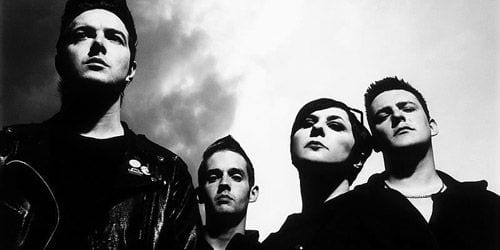
Upon first glimpse, everything about the Scottish foursome Glasvegas comes off as trite, unapologetically calculated, and even bordering on novelty. There’s that terrible band name. The Jesus and Mary Chain ripoffs, from the waves of feedback to the pompadours, to the shades. The girl who drums standing up, Moe Tucker style. The blatant homages to the girl-group pop of Phil Spector and the Brill Building. The pop culture references. The constant singing in an intentionally thick Glaswegian brogue. Lyrics that, when they aren’t dripping with sappiness, unironically quote children’s rhymes. Alan McGee’s drooling over the band’s look and sound, precipitating a tsunami of hype from the British music press. Raw-sounding demos praised by indie bloggers replaced by an album boasting slick, grandiose, mainstream-friendly production in the vein of Oasis and U2. Without even a Stateside release date, leading up to the September UK release of their eponymous debut full-length, it seemed like Glasvegas was already primed for a backlash.
However, even the most contrived music can work if the artist sells it convincingly enough, and although theoretically Glasvegas has no business being as good as it is, its likeable, rosy-hued earnestness casts aside any doubts. The overblown Rich Costey production, cleverly offsetting those Psychocandy-like squalls of noise and dreamy Spectorian melodies with a very clean, bombastic mix, creates an appropriate backdrop for singer James Allan’s tales of teen melodrama, perfectly exemplified by the two terrific 2007 singles, “Daddy’s Gone” and “It’s My Own Cheating Heart That Makes Me Cry”. While the record’s undeniable hooks draw us in, though, it’s the album’s recurring theme of childhood innocence lost, and the sincerity in Allan’s singing, that cinches it.
“Kids can be cruel, that’s fair to say,” Allan sings on “Lonesome Swan”, defiantly bucking the trend set by more self-referential UK acts like Art Brut and Los Campesinos, opting for direct sentimentality instead. When a grown man writes a song about an abandoned pedal boat, you know it’s going to get syrupy, but when Allan chooses to focus on the fate of his young protagonists (presumably set in Allan’s tough childhood neighborhood of Dalmarnock), combined with those oft-imitated “Be My Baby” intro beats and twinkling 6/8 melodies, it’s genuinely affecting. A kid sees his family torn apart (“All I wanted was a kick-a-bout in the park / For you to race me home when it was nearly getting dark”). A boy desperately tries to make his father proud by participating in a schoolyard fight (“If he wants you to run away / Don’t you fucking run away”). Another is confronted with gang violence and has to make a decision (“I seen their swords and their knives / And I changed my mind”).
The album’s opening trifecta of songs is extraordinary, brilliantly milking pop music cliché for all it’s worth. The gorgeous “Flowers and Football Tops” starts off plaintively and erupts with those emotional bursts of guitar noise as a father learns of his son’s death, the well-meaning streetside shrine in the song’s title serving as no consolation, and the song concludes with Allan audaciously but mournfully crooning “You Are My Sunshine”. Even better is the sweet “Geraldine”, the one song on this rather bleak album that attempts to let some light in, Allan and his bandmates playing the Jesus and Mary Chain card to the hilt, his social worker narrator offering compassion in a cruel world. “It’s My Own Cheating Heart That Makes Me Cry” is as over the top in its misery as the title implies, almost comically so (“Liar liar pants on fire / Lies, alibis, lies, more alibis”), but Allan’s anguished delivery makes such childish lines plausible, the bombastic refrains punctuated by Caroline McKay’s spartan, metronomic drumming.
At times Glasvegas teeters precipitously towards the ham-fisted. The original rockabilly arrangement for “Stabbed” is abandoned in favor of a nearly ludicrous spoken word piece backed by Beethoven’s “Moonlight” Sonata. “Ice Cream Van” takes heavy-handedness to a new level (“Bring back the glory days / Active citizenship and pure community”), but the album never wavers, even though that tightrope walk is sometimes far from graceful. While a band like the Raveonettes takes a considerably more nuanced and savvy approach to a similar formula, on this record, James Allan’s blunt, sensitive tough-guy act manages to pack an emotional wallop that will catch many folks off-guard. The album’s a bit of a fluke, no question, but it’s also an absolute gem.

![Call for Papers: All Things Reconsidered [MUSIC] May-August 2024](https://www.popmatters.com/wp-content/uploads/2024/04/all-things-reconsidered-call-music-may-2024-720x380.jpg)



